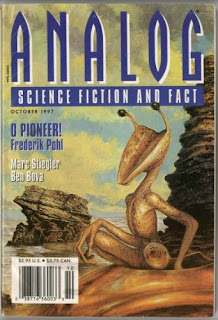Beyond, July 1954
The novella in the July issue is "No More Stars", by "Charles Satterfield" -- a name Frederik Pohl used quite often as a pseudonym, though this time, its first use, it's a Pohl/Lester Del Rey story. It's about a man snatched from death into a world in which some sort of Ptolemaic magic/astrology is true, and an attempt to save the literal firmament from destruction. Not bad, kind of original.
Galaxy, July 1955
The stories include installment 2 of the notorious contest-winning serial "Preferred Risk", by Edson McCann. McCann, of course, was actually Frederik Pohl and Lester Del Rey, who whipped out the novel on short order when Gold couldn't find a worthwhile novel by an unpublished writer to win Galaxy's first novel contest. This installment is about 14,000 words -- I have no other comment as I have never read the story.
The lead novelet is also by Pohl, "The Mapmakers" (12,000 words). Navigating hyperspace is very difficult, and can only be accomplished by especially trained eidetic memories called Celestial Atlases. The Terra II, thus, is in big trouble when a meteor kills their Atlas, and blinds another officer. They seem likely to be stranded thousands of light years from Earth -- unless they can find another way to navigate. Pretty minor Pohl, it must be said.
Galaxy, July 1958
The short stories are by "Paul Flehr", L. J. Stecher, Jr., and Arthur Sellings. "Flehr" is of course a pseudonym for Frederik Pohl. I first read "We Never Mention Aunt Nora" in Pohl's "Best of" collection back in the mid-70s, so the "Flehr" name never fooled me. I'm not sure why he used this pseudonym when he did -- for about 5 stories in 1958 and 1959. Earlier he had used "Charles Satterfield" and "James MacCreigh". (Though the Satterfield name was used at least once for a collaboration with Lester Del Rey (other times for solo stories). The MacCreigh name was used for collaborations with Judith Merril and with Isaac Asimov, but in those cases the story was credited to "James MacCreigh and collaborator".)
At any rate, I really like "We Never Mention Aunt Nora", a brief (3400 words) smart SF horror tale. Aunt Nora is the disreputable relative of an bachelor and his sister -- disreputable because she lost her virtue to a man who later disappeared. The sister falls suddenly in love with a handsome and rich young man, and her brother's objections to the sudden marriage are overcome by wealth and a nice prenup. The ending and the corresponding revelation of Aunt Nora's past are predictable, perhaps, but nicely sprung on the reader.
Galaxy, June 1959
The cover story, as mentioned, is by Frederik Pohl. "Whatever Counts" is a novella of about 22,500 words, and so listed on the TOC. (I think Galaxy was one of the first SF magazines, if not the first, to use "Novella" as a length category.) A human ship has made it to the planet Aleph Four, with 58 people ready to colonize. But the grey, biped but rhino-like, aliens called Gormen have got their first. The Gormen refuse to communicate or negotiate with humans, and they are preternaturally fast and can control their own ships manually, while humans need computer help. The humans are imprisoned and subjected to experimentation, and their ship is destroyed. The ship's psychiatrist appears to be helping the aliens, leading to general hostility, even from pretty young Rae Wensley, who had previously been one of the few people who liked the man. The situation seems hopeless, but, it turns out, the psychiatrist had a plan all along. I don't think this is one of Pohl's better efforts -- the solution, though clever, is not really plausible, and the characters don't really come into focus.
If, November 1964
It also had one of Frederik Pohl's most sentimental stories, but a pretty effective one: "Father of the Stars", about a man who spent his life and fortune supporting a monumental effort to send Slower Than Light colonizing ships to likely stars, only to see this effort rendered obsolete by the invention of FTL.
Odyssey, Spring 1976
Pohl's "The Prisoner of New York Island" is a rather obscure piece from him -- I can't find any evidence that it has ever been republished. (And a quick glance at The Years of the City indicates that it wasn't incorporated into that either.) Does anyone know any more about it? The story itself is OK, not great. It's about a couple from a group marriage in Tucson who come to visit the rather decayed New York, sometime in the middle of the 21st Century. Their mission is to find the body of their fiance, who died in an accident. To bury him? Nah, for genetic material.
Cosmos, May 1977
Pohl's "Rem the Rememberer" is a preachy story about a boy who may live in a utopian future and dream of a dystopian alternative, or vice-versa.
Analog, October/November/December 1997
 |
| (Cover by Bob Eggleton) |
Locus, October 2005
This is in many ways an aging field, and the September Asimov’s provides some evidence of that by featuring stories by two writers in their 80s. But both are close to the top of their form. Frederik Pohl’s “Generations” is a very cynical but also SFnally involving post-9/11 story, following several linked people from 2001 to a few decades in the future. At one level it is a depressing story of political decay, as the West becomes enmeshed in an ongoing war against Islam, with a concomitant decay of civil rights in the U. S. But there is another intriguing aspect, as a discovery about the nature of the universe pulls the foundations from under both science and established religions – but the replacement isn’t exactly nice. Solid work.
Short review of Turn Left at Thursday
 |
| (Cover by Richard Powers) |
No comments:
Post a Comment